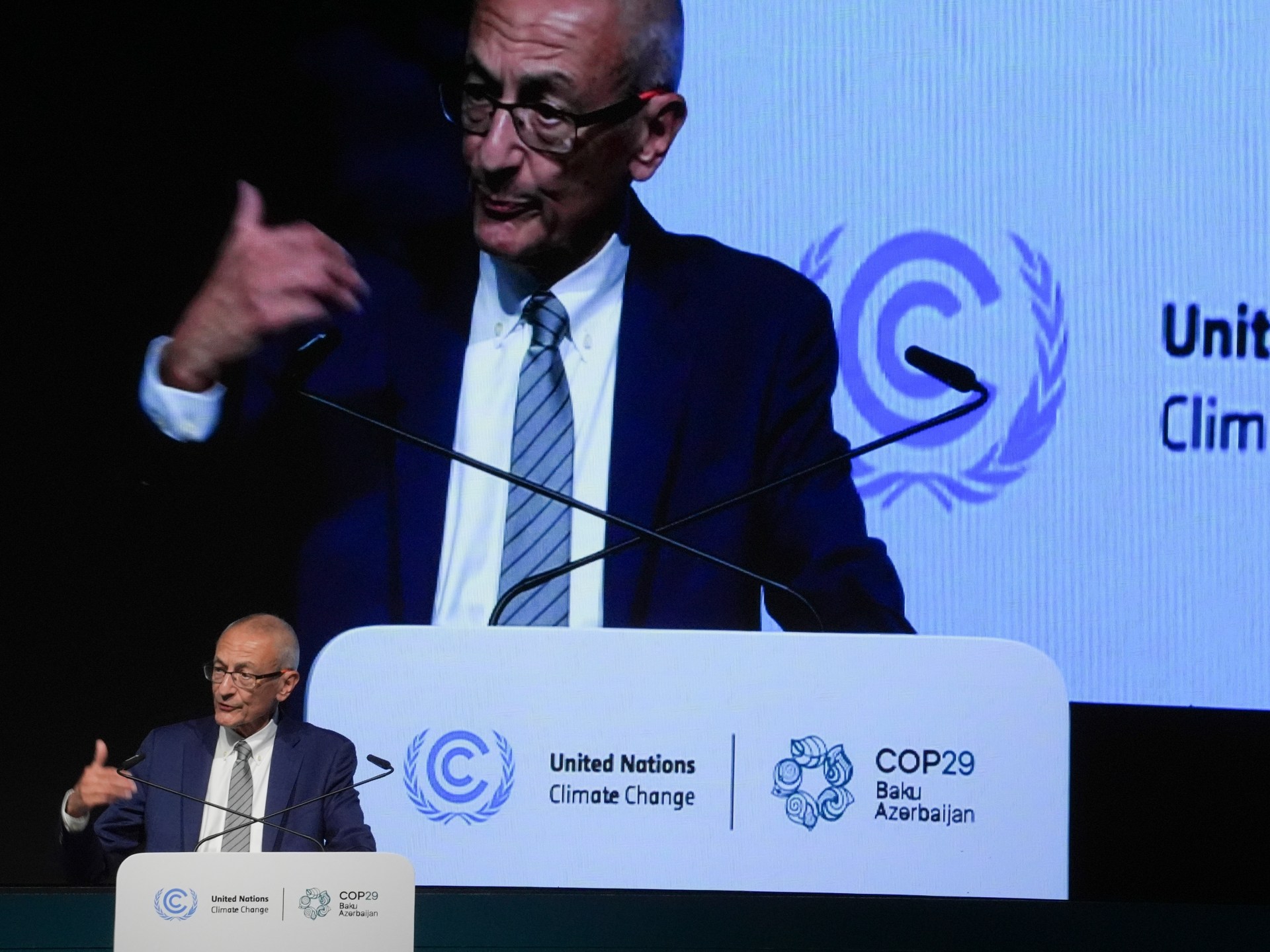US climate envoy John Podesta has called on governments to believe in the United States’ clean energy economy, saying President-elect Donald Trump can slow but not stop its climate change pledges.
On Monday, during the first day of the United Nations Climate Change Conference, COP29, in Baku, Azerbaijan, Podesta told the summit that Trump’s electoral victory last week was “obviously bitterly disappointing”.
“But what I want to tell you today is that while the United States federal government, under Donald Trump, may put climate action on the back burner, the work to contain climate change is going to continue in the United States,” Podesta said.
He added that outgoing President Joe Biden’s landmark climate legislation, the Inflation Reduction Act (IRA), which provides billions of dollars in subsidies for clean energy, would continue to drive investments in solar, wind, and other technologies.
“I don’t think that any of that is reversible. Can it be slowed down? Maybe. But the direction is clear,” he said.
“This is not the end of our fight for a cleaner, safer planet. Facts are still facts. Science is still science. The fight is bigger than one election, one political cycle in one country. This fight is bigger, still, because we are all living through a year defined by the climate crisis in every country of the world,” he added.
However, during his election campaign, Trump said he would withdraw from the Paris Agreement to reduce global temperatures to below two degrees, roll back parts of the IRA, and increase already record-high fossil fuel production.
He previously called emissions regulations part of a “green new scam” and claimed, without elaborating, that offshore wind turbines harm whales.
Carbon market framework agreed
In an early deal at COP29, governments at the talks approved new UN standards for international carbon markets in a key step towards allowing countries to trade credits to meet their climate targets.
Nearly 200 nations agreed to a number of crucial ground rules for setting a market in motion after nearly a decade of complex discussions.
Other key aspects of the overall framework still need to be negotiated, experts said, but the decision brings closer a long-sought UN-backed market trading in high-quality credits.
“It’s hugely significant,” Erika Lennon, from the Center for International Environmental Law (CIEL), told the AFP news agency in Baku, saying it would “open the door” for a fully-fledged market.
Carbon credits are generated by activities that reduce or avoid planet-heating greenhouse gas emissions, like planting trees, protecting carbon sinks or replacing polluting coal with clean-energy alternatives. One credit equals a tonne of prevented or removed heat-trapping carbon dioxide.
The benchmarks adopted in Baku will allow for the development of rules including calculating how many credits a given project can receive.
Once up and running, a carbon market would allow countries – mainly wealthy polluters – to offset emissions by purchasing credits from nations that have cut greenhouse gases above what they promised.
Taliban delegation attends COP29
Afghanistan has sent a delegation to the UN climate summit for the first time since the Taliban’s return to power in 2021.
Matiul Haq Khalis, the head of the country’s National Environmental Protection Agency, told The Associated Press news agency that Afghanistan was among the worst affected countries by climate change, dealing with extreme weather patterns, such as erratic rainfall, extended droughts and flash floods.
“All the countries must join hands and tackle the problem of climate change,” said Khalis, speaking through a translator.
He added that Afghanistan had prepared national action plans to address climate change and would update its climate goals within the next few months.
Khalis said the country had great wind and solar power potential but needed international support.
He also thanked Baku’s government for inviting the Taliban to the UN talks, as the Taliban do not have official recognition as Afghanistan’s government.
The UN climate summit is set to take place for the next two weeks and cover climate finance for developing countries and ways to transition away from fossil fuels.
∎
